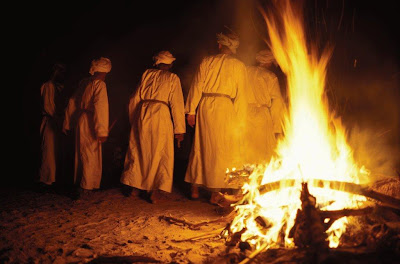When I was a kid, occasionally Leonard Nimoy’s mug would pop onto my Sunday evening television and take me to a world of unsolved mysteries with strange and unusual occurrences. In his 22-episode “In Search of” series, he looked at places and situations that defied explanation and understanding—Bigfoot, Stonehenge, UFOs—and provided "a possible explanation for the phenomenon being examined.” Since then, I’ve been on my own search for people, places and cultures that challenged the norm.
 Something away from the coastal lifestyles and experiences that defined my own existence in the boroughs of New York, Seattle’s waterfront, and the suburbs of Los Angeles. Often when I am cooped up in my office, I do what millions of other vacation-bound travelers do: search for the magical place, loved by Mother Nature, untouched by Father Time and not ruined by tourism that tramples the land and disrupts the atmosphere.
Something away from the coastal lifestyles and experiences that defined my own existence in the boroughs of New York, Seattle’s waterfront, and the suburbs of Los Angeles. Often when I am cooped up in my office, I do what millions of other vacation-bound travelers do: search for the magical place, loved by Mother Nature, untouched by Father Time and not ruined by tourism that tramples the land and disrupts the atmosphere.
I stumbled across a webcam on a weather Internet site showing live feeds from Muscat in Oman. This particular camera is perched above a white sand beach on the southeast coast of the Arabian Peninsula just a stone’s throw from the United Arab Emirates. I clicked on to see the morning sun rising above the calm of the Gulf of Oman and the beautiful palms that line the beachscape. The day’s earliest risers take a stroll with their morning coffee, while others kayak in the calm waters.
 It is easy enough to place myself across 12 hours of time zones and conjure the emotional pleasure of breathing pure air and then donning a dishdasha—aka the national dress for Omani men,as I head off to work. It is a simple ankle-length gown with long sleeves; a muzzar—a turban of finely woven cotton fabric wrapped around an embroidered cap known as kummar; and comfortable leather sandals.The Oman I’ve come to know is not some repressed society where women are bottled up and illiterate or where dirt paths serve as infrastructure. It is the vision of His Majesty Sultan Qaboos Bin Said, who took power nearly 40 years ago from his father. Oman now stands as a picture of peace and prosperity. Forty years ago, this country’s outlook wasn’t as bright. It was a medieval land where the twentieth century barely infringed upon daily life. With only three continuous kilometers of paved highway in the entire country, talk was more about the civil war in the south and countrywide tribal tension than how Oman could recapture its stature as the primary and historic seaport in the region and capitalize on its treaties and trade agreements with Great Britain and the United States. In 1970, its single major hotel, the Muscat Intercontinental, was known as the “hotel in the desert,” surrounded for as far as you could see with nothing but desert. There were 3 schools with 900 students, and now there are 1,000 schools with 65,000 students—over 50 percent of which are women. Indeed, it’s not His Majesty’s father’s Oman.
It is easy enough to place myself across 12 hours of time zones and conjure the emotional pleasure of breathing pure air and then donning a dishdasha—aka the national dress for Omani men,as I head off to work. It is a simple ankle-length gown with long sleeves; a muzzar—a turban of finely woven cotton fabric wrapped around an embroidered cap known as kummar; and comfortable leather sandals.The Oman I’ve come to know is not some repressed society where women are bottled up and illiterate or where dirt paths serve as infrastructure. It is the vision of His Majesty Sultan Qaboos Bin Said, who took power nearly 40 years ago from his father. Oman now stands as a picture of peace and prosperity. Forty years ago, this country’s outlook wasn’t as bright. It was a medieval land where the twentieth century barely infringed upon daily life. With only three continuous kilometers of paved highway in the entire country, talk was more about the civil war in the south and countrywide tribal tension than how Oman could recapture its stature as the primary and historic seaport in the region and capitalize on its treaties and trade agreements with Great Britain and the United States. In 1970, its single major hotel, the Muscat Intercontinental, was known as the “hotel in the desert,” surrounded for as far as you could see with nothing but desert. There were 3 schools with 900 students, and now there are 1,000 schools with 65,000 students—over 50 percent of which are women. Indeed, it’s not His Majesty’s father’s Oman.
The Sultanate now belongs to this visionary ruler, who saw and understood the intrinsic value of 2,700 kilometers of coastline. I find it ironic that Dubai and all of its well deserved publicity is derived from manufacturing over 1,000 kilometers of beach to add to its coastline and to build its man-made islands and marinas when Oman possesses so much coastline. All of it (it seems) uncommercialized and sublime. Oman is the direct opposite of capitalistic Dubai, in touch with its heritage, now progressing naturally and all the while happy for it.
When I arrived in late summer, with my wife, I came there to find myself like some wayward worker, worn from the rat race of meetings, memos and blackberries. I felt the grind and needed a total reversal and found it my first morning.
Now I walk along Boushar beachfront where the crystal Gulf waters mirror images of glorious mountain ranges, creating an oasis of mysticism and luxury. The magic I was searching for surges through me, taking over as if being drawn again by one of those clever Pixar animators. We’re greeted by passersby with the all-purpose, ahlan wa salan! (welcome). I return the greeting without thinking, as if I’ve said it all my life.
Although a lot has changed since 1970, that welcoming hospitality remains despite growing tourism, mainly from Germany, Great Britain and Australia. “It’s good that more people are coming,” says Saif Hamad, owner of a small shop in the Old Muttrah Souk. Oman’s oldest souk is reminiscent of Cairo’s Grand Bazaar, except that the frenzied negotiation and cajoling is practiced by experts in Egypt. Here old world charm hugs you and invites you to shop and experience. Saif sells two things, muzzars and kummars. There are lovely cashmere muzzars that sell for 15 riyals ($45 USD), silk ones that go for 10 and touristy ones for a couple of riyals. The merchandise is for locals and tourists alike. He’ll even teach you to wrap it “hurr.” Gratis. Free.
 |
| “There are people who come across many oceans to Oman, and many don’t even know where they are,” Hamad says. “Sometimes when people say ahlan wa salan, it hurts my ear.” |
The concept of acceptance implied by the term has come to mean everything and anything here, and sometimes nothing at all. “For Omanis, ahlan wa salan is not just some hollow tourist slogan you say to make the next sale or give yourself some false sense of cultural pride,” Hamad says. “We are still living it day by day.”
This may be. But the real ahlan wa salan is always easy to find in Oman, whose transformation is on full display and not masked by a pretentious show of fancy props and billion dollar resorts that hide the real face of the land. Oman’s greatest asset is Oman, itself, in this version of Earthly Paradise. Actually, nature’s perfect pentagon thrives in Oman. Lush mountains. Arid deserts. Exotic marine and animal life. Tropical oases and the aforementioned beaches. They are all there ready to be enjoyed, although it is indeed at odds with the ambitions of those who promote tourism here. After all, with only 9,500 hotel rooms in the entire country, even a small bump in tourist growth would illustrate the need to fast track the plans on the board to increase lodging capacity.
One result of the country’s renaissance and modernization is that the readily available adventure guides are equipped with handy GPS systems and well planned itineraries. In Oman, I love to scout a new spot and make plans for a three-day getaway. Our favorite is a desert trek through Hatta and then crossing the northern Hajar Mountains of Oman over 3,500 meters above sea level. I love to wake up before sunrise, slip on my hiking boots, canyon shirt and my convertible pants and dive into the day, hiking, idly getting a feel for the culture and traditions of the local mountain people Jebalis. This is a trek of variety, making our way through sand dunes, dry and wet wadis and challenging mountain tracks. I have spent entire mornings in the desolate camel country, pausing to inspect a massive caravan of the migrating humpbacks, then passing an afternoon with the Jebalis, who typify ahlan wa salan with offers of Arabic chai and unlimited stories of days past. (When walking through their idyllic villages it’s helpful to have a guide to translate their unique language.)
On this trek, my ambition might be no stronger that to spend the night stargazing. In Oman, it was the first time I really saw stars. My mind screamed. As a young man growing up in Seattle, I remembered seeing stars, but never like this—millions of tiny lights struggling to outshine one another. As they succeeded in illuminating the deep, dark night sky, a surge of emotions filled my body along with the cool breeze originating from the fresh rainfall that had settled in the nearby wadi. I couldn't have stumbled upon a more romantic place on earth, and there I was spending it with my wife and soul mate. For the first time in our lives we communicated without uttering a word. It is here that we hid from the obligations of the world and connected through our love of the terrestrial world.
Surely others have seen the untouched beauty of Oman. It is my hope that those to come will leave it as I first found it in my search for the magical exploration.







